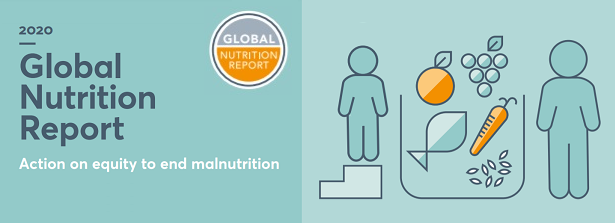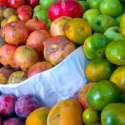Spot on: Action on equity to end malnutrition

Every year the Global Nutrition Report (GNR) succeeds in inspiring the international nutrition community. The 2020 edition is revolutionary as it focuses on the “underlying inequities, the unjust systems and processes1” that result in the unequal distribution of opportunities in the world, between and within countries, rural and urban, poor and rich, men and women as the root cause of malnutrition. “Underweight can be ten times higher in the poorest countries than in wealthier countries”, while in the wealthier countries “overweight and obesity prevail at rates of up to five times higher”. As long as inequity is taken for granted, food and nutrition interventions are merely scratching the surface. “Poor diets and resulting malnutrition are not simply a matter of personal choices. Most people cannot access or afford a healthy diet or quality nutrition care”2.
The GNR 2020 uses “nutrition equity” as a concept to further unravel the inequities, to show “how they determine opportunities and barriers to attaining healthy diets and lives”. This focus is spot on as we live in a world where the rich are getting richer, where millions have become displaced or refugees, a world where multi- and transnational companies can escape from paying taxes. This is even more relevant in the context of the COVID-19 crisis, which exposes inequities that “exacerbate existing inequalities in nutrition outcomes that in turn can lead to more inequity, perpetuating” a vicious cycle.
Last year the leading “Global Syndemic of Obesity, Undernutrition, and Climate Change: The Lancet Commission report” paved the way for this focus. It observed that “socially disadvantaged communities are disproportionally affected by undernutrition, climate change, and increasingly by obesity” and have poor access to “fair and just opportunities to healthy food, options for physical activity, and a healthy environment”. The report analysed how to address power asymmetries in the food system and described neoliberalism as a cause of growing inequalities within and across countries. The GNR 2020 examines this further: “inequalities in nutrition outcomes between and within countries are caused by processes of unfairness, injustice and social exclusion start at the basic level and extend to the underlying level.” This occurs in all domains, from education to healthcare to social protection in all countries. The GNR 2020 calls for a “pro-equity agenda”and “an equity-focused approach to food systems that deliver healthy diets would therefore ideally consider actions that seek to reduce inequities in the immediate conditions in which people are born, live, work and play. It would also directly address food availability, accessibility and price in local food environments.”3
What does the Global Nutrition Report bring for the ‘global nutrition’ community in the Netherlands? The Dutch Ministries of Foreign Affairs and Agriculture, Nature and Food Quality tend to seek solutions for international food insecurity and malnutrition through collaboration with Dutch companies. In the famous Dutch Diamond approach such cooperation is designed together with research institutes, universities as well as Civil Society Organizations (CSOs). Also the GNR 2020 sees opportunities in engagement with the private sector, for example building on the innovative capacity of the food industry. Yet, it recognises that this requires both consumer demand and strong government regulation. It also points out that there is an “implicit tension between government action to promote food security and economic growth by encouraging investment, and government action to reduce the consumption of highly processed foods to prevent diet-related NCDs”. During the Future of Food Symposium at FAO Rome in 2019 concerns were expressed on ultra-processed foods and the impact on nutrition, health and planet of multinational companies’ domination in the current food system4. The Syndemic Report advised strongly against private sector involvement in policy development. The GNR 20205 implies this in the chapter on Food Systems and Nutrition Equity “addressing inequities within food systems is ultimately about addressing power imbalances: amplifying the voice of those excluded, and holding the powerful to account.” We need to develop a whole new way of doing business in the food system, which GNR elaborates upon: “New decision-making and accountability mechanisms are needed to address the uneven power dynamics.” Therefore: “Policymakers need to create strong regulatory and fiscal frameworks [free from conflict of interest] that provide guidance to those who produce the diets from our food systems.”6
This aligns with the recommendations of the Netherlands Working Group on international Nutrition (NWGN) in their advice to Dutch Ministry of Foreign Affairs in 20197captured in the box:
“Reflect on the experiences of a decade of working with the private sector, and take into account external knowledge about effective public private partnerships.”. Consider therefore:
- How to ensure more support goes to family farms, smallholders and small and medium sized enterprises (SMEs)
- How to strengthen governance and corresponding capacity development to ensure that governments and civil society take control over developing and implementing evidence-based policies beneficial for health and planet, without vested commercial bias?
- How to overcome conflict of interest without undermining benefits to health and planet?
- How to encourage the private sector to be part of the solution and leverage the partnership with other diamond actors to developing sustainable and health-promoting business models and shift business outcomes from a short-term profit focus only, to sustainable, profitable models, reaching the most vulnerable groups in particular?
- How to increase accountability of all partners in the Diamond?
- What are the optimal principles of engagements in Public Private Partnerships?
The Ministry of Foreign Affairs has agreed to review the Dutch Diamond approach as part of the Dutch contribution to the postponed Nutrition for Growth summit 2020 in Tokyo. As there is no one size fits all approach to advance nutrition, it is clear that for a successful impact more human resources capacity at the level of focus countries is needed in my opinion. This includes experts who are capable to assess and analyse both the inequities and nutrition needs. This also includes equity- and nutrition-sensitive business developers who have an eye for sustainable development and who can identify and support multiple small scale interventions to build up the food system in response to local needs and opportunities, and simultaneously create jobs for vulnerable groups. Indeed – as the GNR recommends – “more granular high-quality nutrition data is needed, (….) equity-sensitive nutrition data from community level, disaggregated by key population characteristics”.
If the Netherlands is serious in advancing nutrition equity here, as well as in the focus countries, we need to stand up for equitable and sustainable agriculture and trade policies in the Netherlands and in the EU. We need consistency in policies across sectors (another NWGN 2019 recommendation), which requires convergence of food security policy with those on e.g. trade, economic growth and climate, and close collaboration within and between relevant departments. We need governance in which short term economic gains are subordinate to long term prospects for a fairer and sustainable world.
Footnotes
- 1. 2020 Global Nutrition Report: Action on equity to end malnutrition. Bristol, UK: Development Initiatives.
In this blog “Italic text” is used to indicate where quotes from the Global Nutrition Report (GNR) have been used. Only for full sentences footnotes are added. - 2. Page 13 of GNR
- 3. Page 79 of GNR
- 4. Proceedings of the FAO International Symposium on The Future of Food: 10–11 June 2019. Rome. https://doi.org/10.4060/ca9186en
- 5. Page 79 of GNR
- 6. Both quotes from page 92 of GNR
- 7. An NWGN sub-group studied four reports on request of MoFA to assess implications for their Food and Nutrition Security policies: The Global Nutrition Report 2018, The EAT–Lancet Commission on healthy diets from sustainable food system , The Global Syndemic of Obesity, Undernutrition, and Climate Change: The Lancet Commission report, The 2019 Global food policy report by IFPRI. https://the-nwgn.org/information/recommendations-for-dutch-food-and-nutrition-security-policy/






